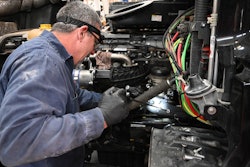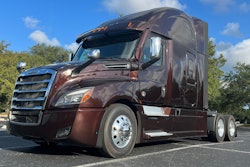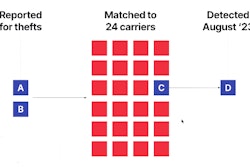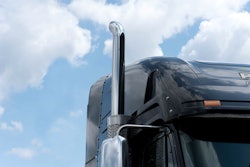Trucking news and briefs for Tuesday, Sept. 12, 2023:
California Senate clears bill to ban driverless vehicles
The California Senate on Monday passed AB 316, a bill that requires trained human operators to be inside an autonomous heavy-duty vehicle while it is operating on public roads in the state. The bill is by proxy a ban of driverless trucks on the state's roads.
The bill was passed in the state assembly earlier this year, but had met resistance from the state's technology and autonomous technology stakeholders, many of which are headquartered in California, and Gov. Gavin Newsom, whose Department of Motor Vehicles (DMV) and Office of Business & Economic Development (GO-Biz) raised concerns with the proposed ban. Newsom still has to sign the bill for it to become law.
“We are disappointed to see AB 316 pass the California Senate. The Department of Motor Vehicles and Governor’s Office of Business and Economic Development (GO-Biz) were correct that AB 316 undermines oversight of expert regulators in California," said Jeff Farrah, executive director for the Autonomous Vehicle Industry Association (AVIA). "AB 316 will also lock in the unacceptable safety status quo on the state’s roads and cause California to miss out on the supply chain benefits of autonomous trucking.”

Farrah urged the governor to veto the bill. The California DMV said it opposes AB 316 because "it will not increase safety and will, in fact, have a chilling effect on the development of technology in California that is intended to result in increased safety benefits on our roadways.”
GO-Biz expressed concern about AB 316’s potential impact on California’s overall economic competitiveness and the state’s ability to carry forward momentum from billions of dollars in recent investments for supply chain infrastructure.
Nearly 8 in 10 Overdrive readers, responding to polling earlier this year, signaled support for the kind of approach taken with AB 316, meanwhile, the large majority on basic safety grounds. The Teamsters Union, too, has voiced its support for the bill since it was introduced, and said it will fight to help ensure the bill becomes law.
“During the pandemic, Gov. Newsom thanked Teamster truck drivers for risking their lives to keep the economy afloat,” said Teamsters General President Sean M. O’Brien. “But he actually needs to prove that he cares about workers by signing AB 316. If Gov. Newsom vetoes this bill, he is putting the livelihoods of hundreds of thousands of truck drivers at risk, while jeopardizing public safety. The Teamsters rightfully stand against such dangerous technology. We will fight to make sure AB 316 becomes law.”
[Related: Calif. bill requiring drivers in autonomous trucks advances]
Democrats urge stricter Phase 3 emissions standards, freight-related group responds
A bicameral group of Democrats last week penned a letter to Environmental Protection Agency Administrator Michael Regan urging the agency to finalize the “strongest feasible greenhouse gas emission standards for heavy-duty vehicles as part of their Phase 3 rule.”
The letter was led by Sens. Alex Padilla (D-California), Edward J. Markey (D-Massachusetts), Tom Carper (D-Delaware), and Martin Heinrich (D-New Mexico), along with Reps. Doris Matsui (D-California), Yvette Clarke (D-New York), and Nanette Barragán (D-California). It’s also signed by six other Senators and 68 other Representatives
It pushes the EPA to be more ambitious by building on the commitment that the nation’s truck and engine manufacturers agreed to in California -- 100% zero-emission vehicle sales by 2036 -- as they finalize the rule. It also expresses support for the EPA’s proposed regulatory changes related to locomotives included in the Phase 3 rule.
“By setting the strongest feasible standards for GHG emissions from heavy duty engines, and by finalizing its locomotive proposal, EPA can meet the Clean Air Act’s mandate to protect public health and welfare,” wrote the lawmakers. “We encourage EPA to finalize standards that go beyond the current proposal and fully incorporate the potential for national emissions reductions highlighted by the technologies and strategies agreed to in the Clean Truck Partnership between CARB and the engine and truck manufacturers.”
[Related: CARB playing hardball: Board votes to ban diesel sales in state by in 2036]
The Clean Freight Coalition responded to the letter, relaying its concern over a push to follow California’s emissions standards at the federal level.
“The Clean Freight Coalition remains concerned that lawmakers and regulators continue to pursue a regulatory agenda that follows California’s mandates that will upend the nation’s supply chain while ignoring immediate, scalable solutions for reducing carbon emissions from existing and future fleets,” said CFC Executive Director Jim Mullen. “It is disappointing that certain members of Congress are pushing a one-size-fits-all environmental agenda that fails to understand the mass diversification of the commercial vehicle industry.”
Mullen added that setting requirements that rely on “technologies that are either in early demonstration phases or not fully developed … will disrupt the nation’s freight network.”
Mullen also outlined ways Congress and regulators could provide immediate emissions reductions, including repealing the federal excise tax on trucks, and promoting and incentivizing low-carbon fuel options like biodiesel and renewable diesel.
[Related: 'Destined to fail': Trucking sounds off to EPA on new Phase 3 greenhouse-gas regs]
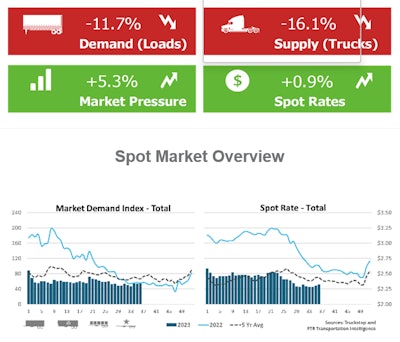 Third straight week of rate gains in spot market | According to the Truckstop load board and FTR Transportation Intelligence's weekly spot market snapshot, flatbed strength over the Labor Day week last week led a nearly 1% gain across segments for average posted rates. It marked the third straight week of rising all-in rates, with dry vans gaining and reefer rates flat. Access more data in the spot market snapshot for the week via this link.
Third straight week of rate gains in spot market | According to the Truckstop load board and FTR Transportation Intelligence's weekly spot market snapshot, flatbed strength over the Labor Day week last week led a nearly 1% gain across segments for average posted rates. It marked the third straight week of rising all-in rates, with dry vans gaining and reefer rates flat. Access more data in the spot market snapshot for the week via this link.
Certain Iowa ag haulers get temporary weight exemption
Iowa Gov. Kim Reynolds on Sept. 11 signed a proclamation related to the weight limits and transportation of grain, fertilizer, and manure. The proclamation is effective immediately and continues through Oct. 11.
It allows vehicles transporting corn, soybeans, hay, straw, silage, stover, fertilizer (dry, liquid, and gas), and manure (dry and liquid) to be overweight (not exceeding 90,000 pounds gross weight) without a permit for its duration.
The proclamation applies to loads transported on all highways within Iowa (excluding the interstate system) and those which do not exceed a maximum of 90,000 pounds gross weight, do not exceed the maximum axle weight limit determined under the non-primary highway maximum gross weight table in Iowa Code § 321.463 (6) (a) and (b) by more than 12.5%, do not exceed the legal maximum axle weight limit of 20,000 pounds, and comply with posted limits on roads and bridges.
